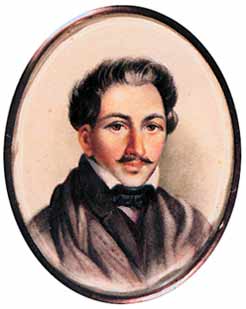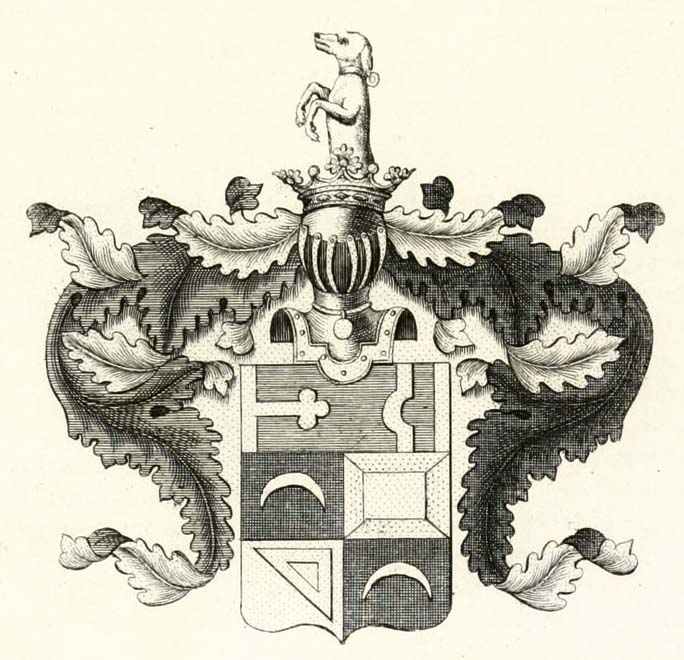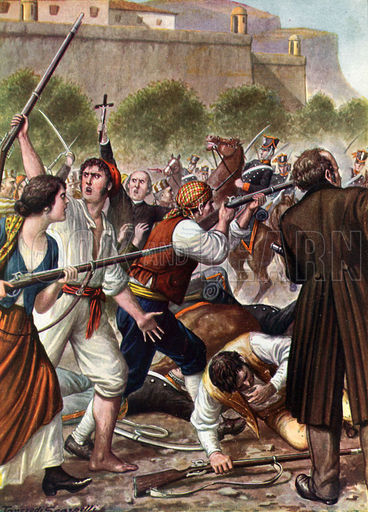|
Decembrists
The Decembrist Revolt ( ru , Восстание декабристов, translit = Vosstaniye dekabristov , translation = Uprising of the Decembrists) took place in Russia on , during the interregnum following the sudden death of Emperor Alexander I. Alexander's heir apparent, Konstantin, had privately declined the succession, unknown to the court, and his younger brother Nicholas decided to take power as Emperor Nicholas I, pending formal confirmation. While some of the army had sworn loyalty to Nicholas, a force of about 3,000 troops tried to mount a military coup in favour of Konstantin. The rebels, although weakened by dissension between their leaders, confronted the loyalists outside the Senate building in the presence of a large crowd. In the confusion, the Emperor's envoy, Mikhail Miloradovich, was assassinated. Eventually, the loyalists opened fire with heavy artillery, which scattered the rebels. Many were sentenced to hanging, prison, or exile to Siberia. The consp ... [...More Info...] [...Related Items...] OR: [Wikipedia] [Google] [Baidu] |
Pavel Pestel
Colonel Pavel Ivanovich Pestel (russian: Павел Иванович Пестель; in Moscow – in Saint Petersburg) was a Russian revolutionary and ideologue of the Decembrists. Early life Pestel came from a Lutheran family of Saxon descent that had settled in Russia during the reign of Peter the Great. His great-grandfather, grandfather, father and uncle had all successively served as director of Moscow's postal mail service, forming a dynasty of sorts. His father Ivan (1765—1843) continued to work his way up through the political bureaucracy to become Governor-General of Siberia from 1806 to 1821 living in St-Petersburg. But because of Speransky Ivan Pestel and his governor in Irkutsk Nikolai Treskin were accused in bribery and in the corrupt regime in Siberia and resigned with shame. In 1805-1809, Pavel Pestel studied in Dresden. In 1810-1811, he was a student at the Page Corps, from which he would graduate in the rank of praporshchik. Pestel was then sent to t ... [...More Info...] [...Related Items...] OR: [Wikipedia] [Google] [Baidu] |
Sergei Petrovich Trubetskoy
Prince Sergei Petrovich Trubetskoy (russian: Серге́й Петро́вич Трубецко́й; 29 August 1790 – 22 November 1860) was one of the organizers of the Decembrist movement. Close to Nikita Mikhailovich Muravyov in his views, he was declared the group's leader on the eve of the December 26 uprising in 1825 but failed to appear, and instead sought refuge in the Austrian embassy. Early years Trubetskoy was born in the noble Trubetskoy family. His father was Prince Pyotr Sergeyevich Troubetzkoy (1760–1817). His mother, Daria (d. 1796), was a daughter of the Georgian prince Alexander Bakarovich Gruzinsky. Troubetzkoy received home education, since 1806 he was attending lectures in the Moscow University. In 1808 he entered Leib Guards Semyonovsky regiment. As a soldier, he participated in all significant battles of Sixth Coalition campaign in 1812-1814 including battle of Borodino, battle of Maloyaroslavets, Battle of Lützen, battle of Bautzen and battle of K ... [...More Info...] [...Related Items...] OR: [Wikipedia] [Google] [Baidu] |
Russian Interregnum Of 1825
The Russian interregnum of 1825 began with the death of Alexander I in Taganrog and lasted until the accession of Nicholas I and the suppression of the Decembrist revolt on . In 1823 Alexander secretly removed his brother Constantine from the order of succession, after Constantine informed Alexander he had no intention of ruling the Empire, and appointed Nicholas heir presumptive. This unprecedented secrecy backfired with a dynastic crisis that placed the whole House of Romanov at peril. Only three men, apart from Alexander himself, were fully aware of his decision, and none of them was present in the Winter Palace when the news of Alexander's death reached Saint Petersburg on 1825. Military governor Mikhail Miloradovich persuaded hesitant Nicholas to pledge allegiance to Constantine, who then lived in Warsaw as the viceroy of Poland. The State Council, faced with a legal Gordian Knot, concurred with Miloradovich; the civil government and the troops stationed in Saint Petersbu ... [...More Info...] [...Related Items...] OR: [Wikipedia] [Google] [Baidu] |
Northern Society Of Decembrists
The Northern Society of the Decembrists (russian: Северное тайное общество) was formed in St. Petersburg after the dissolution of the Union of Prosperity. Its members participated in the Decembrist revolt. Formation The Northern Society was formed in St. Petersburg in 1822 from two Decembrist groups headed by Nikita Muravyov and Sergei Trubetskoy. When the Union of Prosperity was dissolved at the Moscow Congress of its leaders in January 1821, it was decided to create a new organization with four boards: in Moscow, Petersburg, Smolensk and Tulchin. However, none of them were created. Some of the future Decembrists, headed by Pavel Pestel, did not recognize the decision of the Moscow Congress and entered the Southern Society in March 1821. In St. Petersburg, the Northern Society appeared, and its organizational structure was formed in 1822. Members of the society were divided into "convinced" (full-fledged) and "agreeable" (unequal). The governing body wa ... [...More Info...] [...Related Items...] OR: [Wikipedia] [Google] [Baidu] |
Nikita Muravyov
Nikita Mikhailovich Muravyov (russian: Никита Михайлович Муравьёв) ( – ) was an Imperial Guards staff officer and plotter in what led to the Decembrist revolt of 1825. Muravyov was active in a number of proto-Decembrist organizations. In 1816, he was among the founders of the Union of Salvation, a secret society. In 1820, he spoke out for republican government in the Union of Welfare. After the Union of Welfare's 1821 dissolution, Muravyov joined the supreme duma and was a leader in the Northern Society, and was elected to the Southern Society's directory. He wrote a draft constitution for a Russian state, and a tract "Curious Conversation" arguing the need to rise against despotism. He was on leave in the country when the Decembrist revolt occurred on 14 December 1825, and did not participate directly in it. But he was complicit, arrested and imprisoned in the Peter and Paul Fortress. He was condemned to death, but the sentence was commuted t ... [...More Info...] [...Related Items...] OR: [Wikipedia] [Google] [Baidu] |
Pyotr Kakhovsky
Pyotr Grigoryevich Kakhovsky (russian: Пётр Григо́рьевич Кахо́вский, 1799 – ) was a Russian Empire officer and active participant of Decembrist revolt, known for the murder of General Mikhail Miloradovich and Colonel Ludwig Niklaus von Stürler. Biography Pyotr Kakhovsky was born in 1799 in Smolensk Governorate to a retired collegiate assessor from an impoverished Polish noble family Kakowski h. Kościesza, Gregori Alekseyevich Kakhovsky (1758–n/a), and his wife from the Smolensk branch of the noble family Olenin, Nimfodora Mikhailovna Kakhovskaya (née Olenina). He had five brothers, Aleksey, Vasily, Ivan, Platon, who all died before 1820, and Nikolay (1790–1845). Though he inherited 250 serfs from his parents, his elder brother eventually found only seventeen after his death; the others either had been sold without land, or had run away, or had died. He studied at Moscow University Boarding School (). He started his military career as a Junker ... [...More Info...] [...Related Items...] OR: [Wikipedia] [Google] [Baidu] |
Mikhail Miloradovich
Count Mikhail Andreyevich Miloradovich (russian: Граф Михаи́л Андре́евич Милора́дович, sh-Cyrl, Гроф Михаил Андрејевић Милорадовић ''Grof Mihail Andrejević Miloradović''; – ), spelled Miloradovitch in contemporary English sources, was a Russian general prominent during the Napoleonic Wars, who, on his father side, descended from Serbian noble family and the katun clan of Miloradović from Hum, in present-day Bosnia and Herzegovina. He entered military service on the eve of the Russo-Swedish War of 1788–1790 and his career advanced rapidly during the reign (1796-1801) of Emperor Paul I. He served under Alexander Suvorov during Italian and Swiss campaigns of 1799. Miloradovich served in wars against France and the Ottoman Empire, earning distinction in the Battle of Amstetten (1805), the capture of Bucharest (1806), the Battle of Borodino (September 1812), the Battle of Tarutino (October 1812) an ... [...More Info...] [...Related Items...] OR: [Wikipedia] [Google] [Baidu] |
Revolutions During The 1820s
Revolutions during the 1820s included revolutions in Russia (Decembrist revolt), Spain, Portugal, and Italy for constitutional monarchies, and for Greek War of Independence, independence from Ottoman rule in Greece. Unlike Revolutions of 1830, the revolutionary wave in the 1830s, these tended to take place in the peripheries of Europe. Timeline * 1820: in United Kingdom of Great Britain and Ireland (Cato Street Conspiracy, Radical War) * 1820: in Spain * 1820: the Liberal Revolution of 1820, Liberal Revolution in Kingdom of Portugal, Portugal * 1820: in Italy * 18211829: Greek War of Independence * 1825: the Decembrist revolt in Russia * 1828: the Decembrist revolution (Argentina), Decembrist revolution in Argentina Europe Italy The Ferdinand I of the Two Sicilies#1820 revolution, 1820 revolution began in Kingdom of Sicily, Sicily and in Kingdom of the Two Sicilies, Naples, against King Ferdinand I of the Two Sicilies, who was forced to make concessions and promise a constitut ... [...More Info...] [...Related Items...] OR: [Wikipedia] [Google] [Baidu] |
Siberia
Siberia ( ; rus, Сибирь, r=Sibir', p=sʲɪˈbʲirʲ, a=Ru-Сибирь.ogg) is an extensive geographical region, constituting all of North Asia, from the Ural Mountains in the west to the Pacific Ocean in the east. It has been a part of Russia since the latter half of the 16th century, after the Russians conquered lands east of the Ural Mountains. Siberia is vast and sparsely populated, covering an area of over , but home to merely one-fifth of Russia's population. Novosibirsk, Krasnoyarsk and Omsk are the largest cities in the region. Because Siberia is a geographic and historic region and not a political entity, there is no single precise definition of its territorial borders. Traditionally, Siberia extends eastwards from the Ural Mountains to the Pacific Ocean, and includes most of the drainage basin of the Arctic Ocean. The river Yenisey divides Siberia into two parts, Western and Eastern. Siberia stretches southwards from the Arctic Ocean to the hills of north-ce ... [...More Info...] [...Related Items...] OR: [Wikipedia] [Google] [Baidu] |
Yevgeny Obolensky
Prince Yevgeny Petrovich Obolensky (russian: Евге́ний Петро́вич Оболе́нский, – ) was a Russian officer from the Obolensky family, one of the most active participants in the Decembrist revolt. Biography Yevgeny Obolensky was born in family of Prince Pyotr Nikolaevich Obolensky (1760–1833), the future governor of Tula. He was educated at home. At first, he served in the military together with his younger brother Konstantin. In March 1814, they entered the 1st training squadron of the Life Guards Artillery Brigade; on 14 October 1817 they were transferred to the Life Guards Pavlovsky Regiment. Obolensky was a supporter of the unification of the Northern and Southern Societies, and conducted negotiations on this in 1824 with Pavel Pestel. He was elected chief of staff on the eve of the uprising, and on 14 December 1825, commander of the insurgent forces instead of Sergei Trubetskoy, who failed to show up. In the course of the uprising, Obolensky was ... [...More Info...] [...Related Items...] OR: [Wikipedia] [Google] [Baidu] |
Russia In The American Revolutionary War
The Russian Empire's role in the American Revolutionary War was part of a global conflict of colonial supremacy between the Thirteen Colonies and the Kingdom of Great Britain. Prior to the onset of the war, the Russian Empire under Catherine the Great had already begun exploration along North America's west coast; and, the year following the war's conclusion, Russia established its first colony in Alaska. Although the Russian Empire did not directly send troops or supplies to the colonies or British Empire during the war, it responded to the Declaration of Independence, played a role in international diplomacy, and contributed to the lasting legacy of the American Revolution abroad. Russia in North America prior to the war As other European states expanded westward across the Atlantic Ocean, the Russian Empire went eastward and conquered the vast wilderness of Siberia. Although it initially went east with the hope of increasing its fur trade, the Russian imperial court in St. ... [...More Info...] [...Related Items...] OR: [Wikipedia] [Google] [Baidu] |
Napoleonic Wars
The Napoleonic Wars (1803–1815) were a series of major global conflicts pitting the French Empire and its allies, led by Napoleon I, against a fluctuating array of European states formed into various coalitions. It produced a period of French domination over most of continental Europe. The wars stemmed from the unresolved disputes associated with the French Revolution and the French Revolutionary Wars consisting of the War of the First Coalition (1792–1797) and the War of the Second Coalition (1798–1802). The Napoleonic Wars are often described as five conflicts, each termed after the coalition that fought Napoleon: the Third Coalition (1803–1806), the Fourth (1806–1807), the Fifth (1809), the Sixth (1813–1814), and the Seventh (1815) plus the Peninsular War (1807–1814) and the French invasion of Russia (1812). Napoleon, upon ascending to First Consul of France in 1799, had inherited a republic in chaos; he subsequently created a state with stable financ ... [...More Info...] [...Related Items...] OR: [Wikipedia] [Google] [Baidu] |







.jpg)